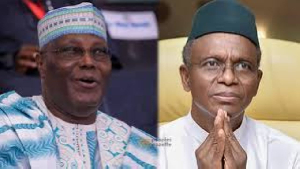The Arewa Economic Forum has warned that the Central Bank of Nigeria’s new recapitalisation policy for Bureau De Change operators could eliminate northern participation in the sector, displace thousands of small-scale operators, and escalate insecurity in the region.
Chairman of the Forum, Dr. Ibrahim Dandakata, made the remarks at a press briefing in Abuja on Thursday, describing the revised capital requirements as “astronomical” and far beyond the financial capacity of most long-standing northern BDC operators.
Under the new regulatory framework issued by the CBN, Tier 1 BDCs are required to maintain a minimum capital base of N2 billion to operate nationwide, while Tier 2 operators must have at least N500 million and are restricted to a single state.
This represents a sharp increase from the N35 million requirement under the 2019 guidelines — a rise of between 1,300% and 5,600%.
Dandakata expressed concern that more than 90 per cent of the BDCs currently positioned to meet the new capital thresholds are located in the South, especially Lagos, which he said dominates the number of compliant operators.
According to him, major BDC hubs in Kano’s Wapa market, Zone 4 in Abuja, Sokoto, Minna, Benin, and parts of Lagos are now at risk of collapse. He also noted that the policy bars banks, NGOs, foreigners, and public officials from BDC ownership and imposes stringent requirements on verifying sources of funding.
He contrasted Nigeria’s policy with those of countries such as South Africa, Ghana, Kenya, Egypt, and India, arguing that BDC licensing in those countries remains relatively accessible and affordable, unlike Nigeria’s increasingly restrictive model.
Dandakata said, “This policy, if left unaddressed, will wipe out the entire northern participation in the BDC space. It is not just an economic issue — it is a national security threat.
“You cannot displace thousands of youths from their means of livelihood in a region already battling terrorism, banditry, and high unemployment without expecting serious consequences. This is not a call for division but a firm plea for equity, fairness, and inclusive economic governance.”
He called on President Bola Tinubu to urgently intervene and urged the CBN to extend the implementation window by six to 12 months to allow for adequate sensitisation and capital mobilisation.
Dandakata also proposed the creation of northern-led BDC consortia and regional investment vehicles to enable smaller operators to remain in business.
He advocated for a more inclusive and phased regulatory approach that considers regional disparities in access to capital.
He further called for transparency in ongoing negotiations between the CBN and the Association of Bureau De Change Operators of Nigeria, stressing that grassroots players must not be sidelined.
Dandakata also emphasised the need for fairness in financial regulatory appointments to reflect Nigeria’s diversity and mitigate perceptions of northern marginalisation.
Also speaking at the briefing, President of Northern BDC Operators, Abdulwahab Yusuf, described the recapitalisation directive as “practical punishment.”
“How can you move share capital from N35 million to N2 billion? And it’s not just that — you can’t even access funding from any bank,” Yusuf lamented. “Any money you bring in must be vetted. You have to give the full history of the money. These are all serious obstacles.”
He added, “Even the N500 million for Tier 2 BDCs is no joke. Forget about N2 billion — where do you get that kind of money? We’ve pleaded with the CBN to extend the timeline. They gave three months initially, then another three months. But the challenges persist.”
Yusuf also noted that, unlike banks, BDCs do not have access to the capital market.
“The banks are recapitalising, but they have access to the capital market. We don’t. So, how are we supposed to raise these funds? It feels like a punishment,” he said
Business News of Friday, 11 July 2025
Source: www.punchng.com













